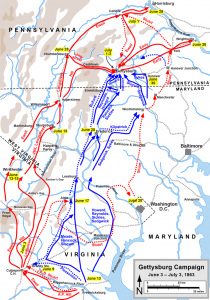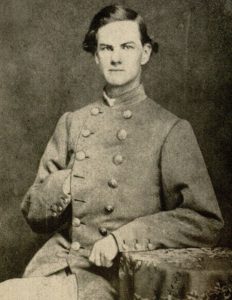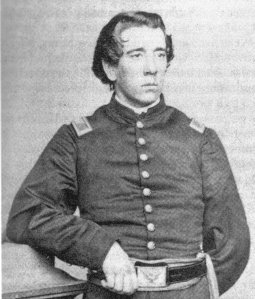“This Morning We Are Marching”: Two Lieutenants & The Gettysburg Campaign, Part 1

Confederate General Robert E. Lee did not call it “The Gettysburg Campaign” when his Army of Northern Virginia began maneuvering away from Fredericksburg and aiming north on June 3. That name would come later since neither Union nor Confederate armies knew that the opening campaign would climax near a little town in southern Pennsylvania.
Over the next few weeks, you’ll find journal or letter excerpts from Lieutenant John Dooley of the 1st Virginia and Lieutenant Elisha Hunt Rhodes along with brief summaries of the campaign progress to “set the scene” that the lieutenants didn’t always know.
June 3 – the campaign begins as Lee leaves A.P. Hill’s Corps entrenched above Fredericksburg to cover the rest of the moving army and secure Richmond.
June 4 – Union General Joseph Hooker receives reports that parts of the Confederate army were on the move.
June 5 – Hooker cancels all furloughs and issues orders to prepare to march. Longstreet and Ewell’s Rebels bivoauc near Culpeper Court House. The Battle of Franklin’s Crossing occurred when Union General Sedgwick led a reconnaissance probe which temporarily delayed Ewell’s movement as Lee waited to see what would develop.
June 6 – Union Cavalry General John Buford had rightly figured out that most of the Confederate cavalry was hanging out in Culpeper County. On June 6, General Stuart hosted a grand review of his Confederate cavalry, an event which would be repeated two days later.
June 7 – Hooker received a mistaken report that Stuart was planning a cavalry raid while Lee pulled the infantry back toward Richmond; the Yankees started planning a cavalry assault. Meanwhile, Lee ordered leading elements of the Confederate cavalry under Jenkins into the Shenandoah Valley.
June 8 – While Lee reviewed the cavalry, Union horsemen prepared to launch an attack.
June 9 – Battle of Brandy Station culminated in the largest cavalry battle fought in North America, ending inconclusively with a tactical Confederate victory and morale Union victory.

Now, the week’s campaigning from the perspectives of two lieutenants:
John Dooley, 1st Virginia Infantry
June 3rd.
This morning we are marching towards Tappahannock. As we rest by the road side a courier rides by, and a little dog belonging to one of the soldiers flies at the horse’s heels, all the while barking furiously. The courier, indignant at this unmannerly interruption, loses all patience, checks his horse’s speed, and drawing his cavalry sword makes a gallant charge. The whole Division sets up deafening huzzas as they witness the act of bravery, and the unfortunate courier rides off completely crestfallen and the subject of numberless sarcasms from the laughing troops.
Elisha Hunt Rhodes, 2nd Rhode Island Infantry
Near Falmouth, Va., June 5th, 1863.
We have spent nearly a month in ordering our camp and now have orders to leave. In fact we are all packed up, and some of the troops are moving towards the river. This looks like another attack upon Fredericksburg. If we do not march tonight a soldier of the 10th Mass. is to be drummed out of service in the presence of the Brigade, and three soldiers are to be shot near Falmouth for desertion. Tomorrow I suppose we shall try to shoot a few Rebels. I wish it was over, for it is worse for a soldier to wait for a battle to begin than it is to do the fighting. Today it is very hot, and the troops marching by are covered with dust, which is not encouraging to us, as we shall be on the road tomorrow. If we do not succeed this time I shall be almost discouraged, for it will make four attempts to take Fredericksburg. It is two years today since our Regiment was mustered into the U.S. Service. Only one more and we expect, or rather hope, to have the pleasure of marching up Westminster Street with our tattered banners. When the war is over it will be a happy time for us. It would be no pleasure to go home now, for I could not stay, but if the victory was won I should be content to remain at home in R.I. [Rhode Island] I hope my next letter will be written nearer Richmond than this one.

June 6, 1863
At 10 o’clock A.M. the 2nd R.I. left their camp at Falmouth and marched to the Rappahannock near to Franklin’s Crossing. Here we halted and waited for orders to cross the river.
Rumford Plantation, Va., near Rappahannock River, June 7/63
We are camped on the north side of the river, and part of the Corps has crossed to the south or Fredericksburg side. The pontoon bridges were laid without much loss of life. The whole movement is a mystery to us, and we do not know the whereabouts of the other Army Corps.
June 9th 1863
Our Brigade with Gen. Wheaton’s Brigade are guarding the north bank of the river. The other Divisions are on the south side, entrenched on the plains. They occupy the rifle pits that we made last May. I am sitting on a hill overlooking both Armies, and I can see long lines of troops both Union and Rebel as they face each other and wait to begin their murderous work. The Batteries occasionally fire at each other and some of the Rebel shell reach our camp.
To be continued next week…
Sources:
Rhodes, Elisha H. edited by Robert H. Rhodes. All For the Union: The Civil War Diary and Letters of Elisha Hunt Rhodes. Orion Books, NY: 1985.
Dooley, John. edited by Joseph T. Durkin. John Dooley, Confederate Soldier: His War Journal. University of Notre Dame Press, IN: 1963.
2 Responses to “This Morning We Are Marching”: Two Lieutenants & The Gettysburg Campaign, Part 1